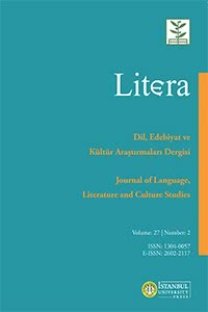Joseph Addison’un Cato ve George Lillo’nun Londralı Tüccar Eserlerinde Tragedyanın Maskülenleşmesi
Masculinization of Tragedy in Joseph Addison’s Cato and George Lillo’s The London Merchant
___
Abrams, M. H. (1999). A glossary of literary terms. Boston, MS: Heinle & Heinle.Addison, J. (2004) Cato: A tragedy and selected essays. Indianapolis,Indiana: Liberty Fund.
Addison, J. (2010). Cato: A tragedy. By Mr. Addison. Without the love scenes. New York, NY: Gale ECCO.
Cowley, H. (2016). The Belle’s Strategem. London, UK: Wentworth Press.
Curtis-Wendlandt, L. (2013). Staging virtue: Women, death, and liberty in Elise Reimarus’s Cato. Journal of the History of Ideas, 74(1), 69–92.
Faller, L. B. (1988). The popularity of Addison’s Cato and Lillo’s The London Merchant, 1700-1776. New York, NY: Garland Publishers.
Freeman, L. (2013). Character’s theater: Genre and identity on the eighteenth century English stage. Philadelphia, PA: University of Pennsylvania Press.
Freeman, L. (1999). What’s love got to do with Addison’s Cato? Studies in English Literature, 39(3), 463–482.
Halliwell, S., & Aristotle. (1998). Aristotle’s Poetics. Chicago, IL: University of Chicago Press.
Harper, K. (2014). Cato, Roman stoicism, and the American revolution. (Doctoral Dissertation). Available from ProQuest Dissertations and Theses Database. (UMI No. 9743523)
Hnatko, E. (1971). The failure of eighteenth century tragedy. Studies in English Literature, 1500-1900, 11(3), 459–468.
Hume, R. (1980). The London theater world, 1660-1800. Carbondale: Southern Illinois UP.
Johnson, S. (1778) “Review” in the literary panaroma. C. Retrieved from www.babel.hathitrust.org
Lillo, G. (1995). The London Merchant or the story of George Barnwell. Eighteenth-Century Plays. New York, NY: Oxford UP.
Morrissey, L. (1998). Sexuality and consumer culture in eighteenth century England: ‘Mutual love from Pole to Pole’ in The London Merchant. Restoration and 18th Century Theater Research, 13(1), 47–64.
Mountfort, W. (2018). Zelmane: Or, the Corinthian Queen. A tragedy. New York, NY: Gale Ecco.
Nicoll, A. (1995). A History of restoration drama, 1660-1700. Cambridge, UK: Cambridge University Press.
Nussbaum, F. A. (1984). The brink of all we hate: English satires on women 1660-1750. Lexington, KY: The University Press of Kentucky.
Schille, C. B. K. (2003). Now, Cato: Addison, gender, and cultural occasion. Restoration and 18th Century Theater Research, 18(1), 31–48.
Straub, K. (1992). Sexual suspects: Eighteenth century players and sexual ideology. Princeton, NJ: Princeton University Press.
Wharton, J. (1778) “Review” in the literary panorama. Retrieved from www.babel.hathitrust.org
- Yayın Aralığı: Yılda 2 Sayı
- Yayıncı: İstanbul Üniversitesi
Joseph Addison’un Cato ve George Lillo’nun Londralı Tüccar Eserlerinde Tragedyanın Maskülenleşmesi
Representing Reality: Erich Auerbach’s Concept of Memory
Nathalie Sarraute’un Çocukluk Anlatısında Bellek*
“The fairy of a thousand lovers”: Notes on Constantinople by Edmondo De Amicis
Postmodern Ögelerin Bir Geçit Töreni Olarak Kuzey Kulesi 107. Kat
Images and Words: Remembrance and Reconstruction of the Cambodian Genocide by Rithy Panh
